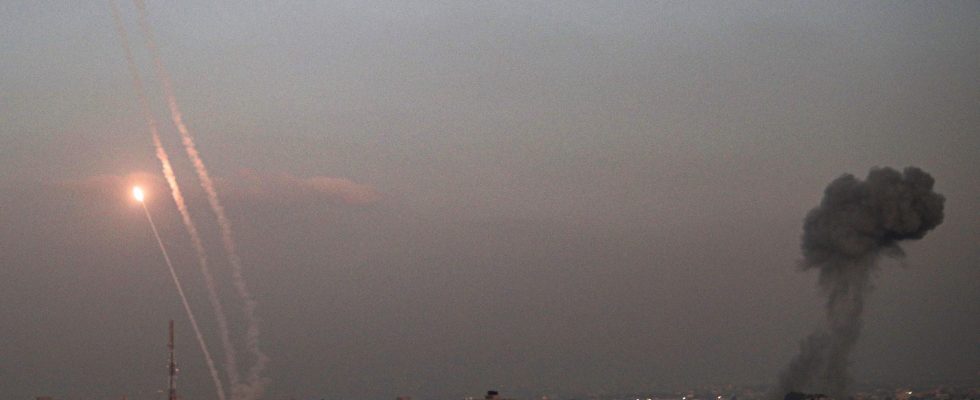Follow the live
The Israeli army is bombing the Gaza Strip this Saturday for a second consecutive day since the end of the truce, which allowed the release of hostages and the delivery of emergency aid.
⇒ “More than 400 targets” have been targeted in Gaza by the Israeli army since Friday
⇒ Israel and Hamas blame each other for the end of the truce
⇒ Exchanges of fire resumed between the IDF and Hezbollah on Israel’s northern border
“More than 400 targets” hit since Friday
“We are currently striking Hamas military targets throughout the Gaza Strip,” Jonathan Conricus, a spokesperson for the Israeli army, declared this Saturday morning, December 2. The IDF said it had struck “more than 400 targets” since Friday in the small territory, illuminated at night by flares fired by the Israeli army. The Health Ministry of Hamas, the terrorist movement in power in this besieged Palestinian territory, has reported more than 240 dead and 650 injured in these Israeli strikes since the end of the truce on Friday morning – figures that cannot be verified by an independent source.
The Israeli army, in a statement this Saturday, wrote that it had “struck” with its “combat aircraft more than 50 targets in the Khan Younes region. “IDF troops struck Hamas terrorists and infrastructure in the Beit Lahia area, using tank fire and launching airstrikes,” she added. Artillery fire and airstrikes were also directed towards the “northern Gaza Strip,” she added. according to the press release. “Terrorist cells”, a “mosque used by Islamic Jihad as an operational command center”, a “weapons storage complex”, were notably targeted, detailed the IDF.
End of the truce: Israel and Hamas blame each other
Israel and Hamas blame each other for the end of the truce, which allowed the release of around a hundred hostages in exchange for that of 240 Palestinian prisoners as well as the acceleration of humanitarian aid in the Gaza Strip . Hamas said it had “proposed an exchange of prisoners and elderly people” among the hostages, as well as the handover to Israel of the bodies of captives “died in Israeli bombings” – the Israeli army confirmed late Friday the deaths of five hostages in the Gaza Strip, giving their names, adding that they had “informed the families of their deaths”.
Israeli Prime Minister Benyamin Netanyahu accused the Islamist movement of having “violated the agreement” and “fired rockets” towards Israel. And his government promised Hamas “the worst beating”. UN Secretary General Antonio Guterres said he “deeply regrets” the resumption of clashes in Gaza which “only shows how important it is to have a genuine humanitarian ceasefire.” “If violence resumes at this scale and intensity, we can assume that hundreds more children will be killed and injured every day,” also warned the executive director of Unicef, Catherine Russell.
The day after a visit to Israel, US Secretary of State Antony Blinken said that the United States, Israel’s main allies, remained “focused” on the release of the hostages. “We continue to work with Israel, Egypt and Qatar to get the truce back on track,” US Defense Secretary Lloyd Austin also declared. Qatar, the emirate which announced the truce, called on the international community to act because the resumption of bombings “exacerbates the humanitarian catastrophe” in Gaza.
Exchanges of fire between Israel and Hezbollah
On Israel’s northern border, exchanges of fire have resumed between the Israeli army and the Lebanese Hezbollah movement, an ally of Hamas. The latter, which claimed responsibility for attacks against Israel, deplored the death of two of its members in Israeli bombings in southern Lebanon, where a civilian was also killed.
Israel carried out airstrikes this Saturday near the Syrian capital Damascus, the Syrian Defense Ministry said. The Syrian Observatory for Human Rights (OSDH), an NGO which has a vast network of sources in Syria, claimed that two pro-Hezbollah fighters were killed in these strikes against “Hezbollah sites”. Questioned by AFP, the Israeli army did not comment on these strikes
Rafah: entry of aid trucks suspended
The truce had offered respite to the inhabitants of Gaza and allowed an acceleration of humanitarian aid. But this flow, although described as very insufficient by the UN, has now dried up. The Palestinian Red Crescent announced on the night of Friday to Saturday that Israel had “informed all NGOs and agencies” having sent aid to the Egyptian Rafah terminal, a crossing point with Gaza, that “the entry of trucks aid was suspended until further notice.
In Egypt’s Sinai, aid is piling up but no trucks have entered since the truce ended Friday morning, officials on both sides of the border crossing confirmed. However, the needs are immense in the territory already subject to an Israeli blockade, where more than half of the territory’s housing has been damaged or destroyed and 1.7 million people have been displaced by the war according to the UN. The health situation is deteriorating: the World Health Organization (WHO) describes 111,000 cases of acute respiratory infection and 36,000 cases of diarrhea in children under five years old among the displaced in Gaza.
